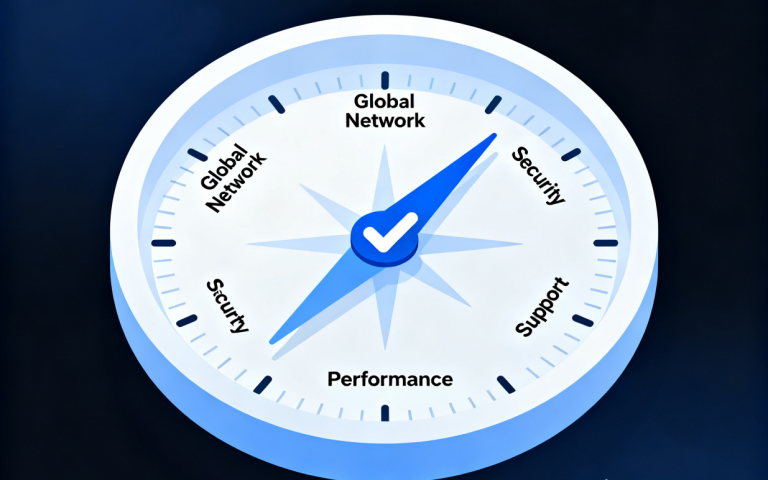
Have you ever tried to buy a new car, only to be overwhelmed by the sheer number of options? There are so many models, each with a different engine size, fuel economy, and safety rating. Choosing the right one can feel impossible, especially when a bad choice could leave you stranded on the side of the road. That's exactly what it feels like when you're trying to choose a Content Delivery Network (CDN) provider for your business. You've heard the promises of lightning-fast speeds and impenetrable security, but when you look at the market, a sudden wave of confusion hits you. Every provider claims to be the fastest, the most reliable, and the most secure. So how do you separate the marketing buzz from the real substance? How do you ensure you're not getting a rusty old clunker when you need a high-performance race car?
Picking the right CDN provider isn't just about a service; it's about a partnership. It's about entrusting your website's performance, security, and uptime to another company. Making the wrong choice can lead to slow load times, security vulnerabilities, and frustrating customer experiences that hurt your bottom line. We're going to dive deep into the seven critical factors you simply cannot ignore when making this decision. Think of this as your pre-purchase inspection checklist for a CDN, ensuring you make a choice that will drive your business forward, not hold it back.
Factor 1: The Global Footprint - Where Are They Really?
This is the most foundational factor. A CDN's power comes from its global network of servers, known as Points of Presence (PoPs). The more PoPs a CDN has, and the more strategically located they are, the better. You might think, "Oh, they have a global network," but what does that really mean? A provider might have a hundred PoPs, but if 90 of them are in North America and your core audience is in Asia, you're not going to see much of a performance boost. It's like having a warehouse in every city in America but no presence in Europe; it’s useless for a European customer.
You need to ask specific questions: Where are their PoPs located? Do they have a strong presence in the regions where your customers live? A truly high-performance CDN should have a balanced and widespread network to ensure low latency for your users, no matter where they are. This is a crucial, often overlooked detail that can make or break your website's global performance.
Factor 2: Performance and Latency - The Speedometer Test
Of course, speed is a huge part of the equation. But how do you measure it? Don't just rely on a provider's marketing materials. A good CDN will have a transparent and public performance page that shows real-time latency data. They should also provide a Service Level Agreement (SLA) that guarantees a certain level of uptime and performance.
Beyond simple metrics, look at the underlying technology. Does the CDN support modern protocols like HTTP/3 and IPv6? Do they have a smart routing system that can dynamically choose the fastest path for a user's request, bypassing network congestion? This is the difference between a simple, static service and an intelligent, self-optimizing network. This is the difference between getting a car that drives fast on a straight road versus one that can navigate through traffic smoothly and efficiently.
Factor 3: Security - Your Digital Bodyguard
As we've discussed, a CDN is not just about speed. It's about security. This is your chance to get a digital bodyguard for your website, but not all bodyguards are created equal. You must look for specific security features.
DDoS Protection: Can the CDN absorb and mitigate a massive Distributed Denial of Service attack? How quickly can they detect it, and what is their process for filtering out the malicious traffic?
Web Application Firewall (WAF): Does the CDN come with a built-in WAF to protect your site from common threats like SQL injection and cross-site scripting? Can you customize the rules to fit your specific needs?
SSL/TLS Management: Does the provider offer easy and automated SSL certificate provisioning and renewal? Can they handle certificates from major CAs like Sectigo and DigiCert?
A CDN with robust security features acts as the first line of defense for your website, protecting it from attacks before they even get close to your origin server. It's a non-negotiable feature for any serious online business.
Factor 4: Pricing Model - Pay-as-You-Go or Flat Fee?
Pricing can be a sudden source of confusion and frustration. Most CDNs use a "pay-as-you-go" model based on the amount of data transferred (gigabytes) and the number of requests. This is great for small businesses with unpredictable traffic, but it can be hard to forecast costs. Others offer flat-fee plans, which provide predictability but might be a bad deal if your traffic is low.
You need to understand your business model and traffic patterns. Do you have a steady stream of traffic, or do you have sudden, massive spikes during sales events? A good provider should be transparent with their pricing and offer a model that fits your needs without any hidden fees. Don't be afraid to ask for a custom quote that matches your expected usage.
Factor 5: Customer Support - The Lifeline
When something goes wrong—and at some point, something will go wrong—how do you get help? A CDN is a complex technical service, and you need a reliable partner. Do they offer 24/7 technical support? Is it via email, chat, or phone? Are their support engineers knowledgeable and responsive?
Don't underestimate this factor. The difference between a quick fix and hours of downtime can be a massive financial hit. A good support team is like a reliable mechanic; you hope you never need them, but when you do, you'll be incredibly grateful they're there.
Factor 6: Ease of Use and API - The User Experience
Is the CDN's control panel intuitive and easy to use? Can you easily set up your caching rules, clear the cache, and view performance analytics? A clunky, confusing interface can slow you down and lead to mistakes.
Furthermore, does the CDN provide a robust API? An API allows you to automate tasks and integrate the CDN into your existing workflows. If you have a large website or an application that requires constant updates, an API can be a game-changer, allowing you to manage your content delivery programmatically without manual intervention.
Factor 7: Customization and Control - The Steering Wheel
Your website is unique, and your CDN should be flexible enough to accommodate your specific needs. A good CDN should provide granular control over its features. Can you set custom caching rules for different file types or locations? Can you purge the cache for a single file or a specific directory, rather than your entire website? Can you configure specific rules for different devices, like a separate set of rules for mobile users?
This level of customization is crucial for optimizing your website's performance and ensuring a perfect user experience. It's the difference between a rigid, one-size-fits-all solution and a flexible platform that you can fine-tune to your exact specifications.
Choosing a CDN provider is not a simple task, but by using this checklist, you can turn a moment of confusion into a confident, well-informed decision. Don't just buy the fastest or the cheapest. Buy the one that offers the best balance of performance, security, and reliability for your unique business needs. It's an investment in your digital future, and with the right choice, it's an investment that will pay off for years to come.

